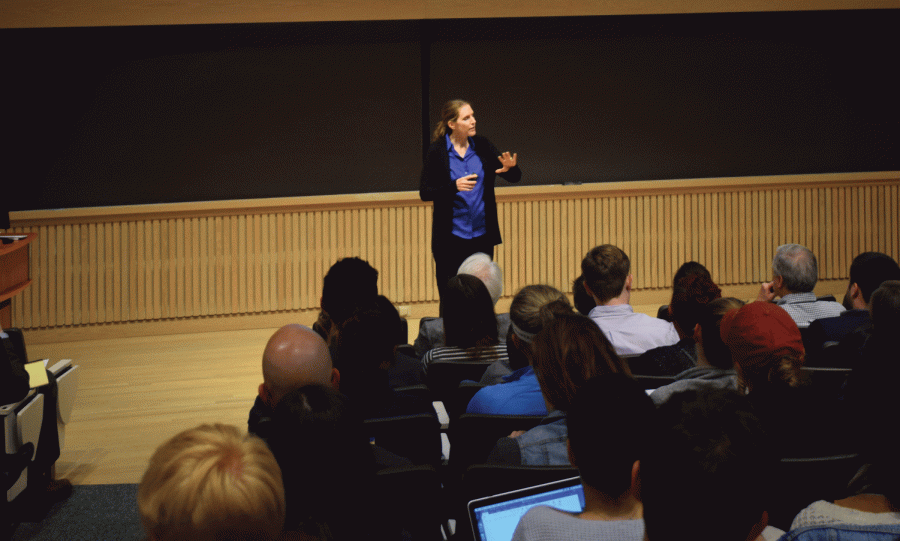Séverine Autessere on the Politics of International Intervention
Séverine Autessere challenges current peacekeeping practices and proposes new solutions to improve efficiency .
On Thursday, September 29, Barnard College’s Associate Professor of Political Science Séverine Autesserre gave a lecture titled “Peaceland: Conflict Resolution and the Everyday Politics of International Intervention” for the ninth annual Peter C. Schaehrer Lecture, organized by the Peace and Conflict Studies (PCON) Department. The Schaehrer Initiative and Memorial Lecture Series was established by the classmates of Peter Schaehrer ’65. Schaehrer is described as an educator and champion of civil rights. The founding classmates join the PCON Department each year as they bring a lecturer to campus for an evening of learning and discussion.
The keynote speaker of the ninth annual Schaehrer Lecture, Autesserre, discussed her newest book, “Peaceland: Conflict Resolution and the Everyday Politics of International Intervention,” with Colgate students, professors and alumni in Love Auditorium. The night began with a series of introductions, first from Professor of Peace and Conflict Studies and Geography Daniel Monk. Monk was heavily involved with the creation of this lecture series and described it as a moving experience for those who have been involved with it over the years.
Following this moving introduction, Assistant Professor of Peace and Conflict Studies Susan Thomson introduced the guest speaker for the evening. Autesserre specializes in international relations and African studies. Autesserre’s accolades include two research awards from the United States Institute of Peace, two Harry Frank Guggenheim Foundation research grants and a Presidential Research Award from Barnard College. Her book “Peaceland” was published in 2014, and won the 2015 Yale H. Ferguson Award and the 2016 Best Book of the Year Award from the International Studies Association.
Autesserre’s book addresses the everyday elements that influence peacebuilding in international interventions and is based on fieldwork research conducted in the eastern region of the Democratic Republic of the Congo. Autesserre drew from previous studies in Burundi, Cyprus, South Sudan, Timor-Leste, Israel and the Palestinian Territories in writing “Peaceland.”
The major question that Autesserre was concerned with was why peacekeepers continue to utilize practices that are clearly inefficient, ineffective and counterproductive to peacebuilding. Her research was based on four types of data: a compilation of field observations, 294 in-depth interviews, document analysis and participant observation. She found that the greatest barrier to successful peacekeeping operations was when local leaders were rarely included during the design phase of operations.
While it is generally agreed that there is no copy-and-paste approach to peacekeeping, each “conflict zone” in which peacebuilding occurs is different and requires a unique approach. In many cases it is clear that peacebuilding and peacekeeping operations on the ground do not reflect this understanding of what makes peacebuilding efforts successful. Autesserre asserted that this issue stems from the great degree of separation between the forces intervening and the individuals involved in the situation on the ground.
Most “interveners” do not have a firm understanding of the history and culture of the people and countries where they are located. The knowledge heralded by inefficient peacekeepers is what Autesserre calls “thematic knowledge” that relies on overly simplistic narratives about a community and what that community needs. This kind of knowledge is the antithesis of “local knowledge,” which is concerned with the language or the opinions of the local population. The value placed on “thematic knowledge” asserts the superiority of foreign interveners, who as outsiders have more influence.
This was new knowledge to a number of members in the audience. Senior Allison Zengilowski was surprised by the possibility that even the most well-known and trusted peacekeeping organizations may be utilizing practices that are wholly ineffective.
“While I had previously always believed that organizations that intervene in conflict zones, such as the United Nations, were engaging in the best practices for the locals and for the resolution of violence, Autesserre has found data contradicting this notion,” Zengilowski said.
Autesserre then addressed two major problems that exist in theories concerning international intervention. The first problem she noted was national and international overemphasis on the capital cities and headquarters of countries that peacekeepers are operating in. This focus takes a “macro” approach and makes it impossible to understand the dynamics on the ground.
The second problem Autesserre addressed was that the everyday lives and culture of those intervening are infrequently considered. The everyday lives of the intervener are influential on the macro level and are therefore pertinent in understanding how to make international intervention and peacekeeping efforts more effective.
Autesserre refers to “Peaceland” as a “portrait of interveners that looks for the commonalities among them.” Ultimately, Autesserre said that the overarching message of her book is not to stop international intervention, but to attempt to make it more effective. One of her suggestions was to isolate strategies that would integrate interveners into local communities, in order to build relationships with and learn from local peoples.
Overall, the students in attendance received the lecture positively. Senior Halle Bills appreciated Autesserre’s holistic and honest approach to peacebuilding.
“I really enjoyed the lecture because [Autesserre] talked about how important the process of making peace is to the end result, which I think is such an important point,” Bills said. “If your process of building peace reinforces power hierarchies, it’s not going to produce effective results.”
The Peter C. Schaehrer Lecture is a highly anticipated event each year by Peace and Conflict Studies concentrators and faculty at Colgate. Senior Kathryn Deaton expressed her satisfaction with the series and how much it has impacted her as a Peace and Conflict Studies concentrator.
“As a senior in the PCON department, I’ve attended the Schaehrer Lecture every year,” Deaton said. “It’s been one of the best parts of my classes to have scholars that we read about come all the way to Hamilton to share their ideas and talk with us.”




